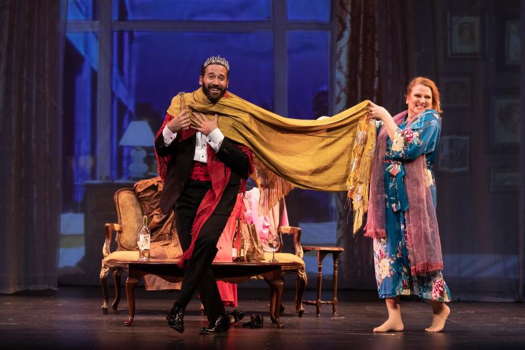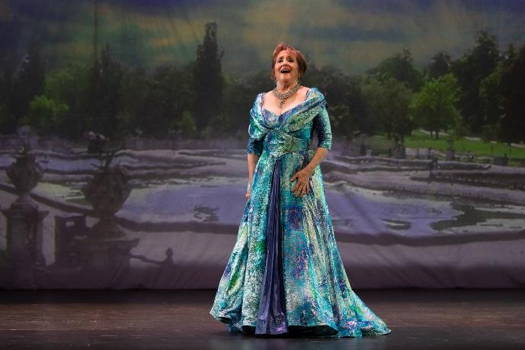- Andrew Carter
- Mariss Jansons
- Christoph Graupner
- Hermann Scherchen
- Poul Rovsing Olsen
- Frances Forbes-Carbines
- Charles Koechlin
- Laurence Olivier
 DISCUSSION: John Dante Prevedini leads a discussion about Music and the Visual World, including contributions from Celia Craig, Halida Dinova and Yekaterina Lebedeva.
DISCUSSION: John Dante Prevedini leads a discussion about Music and the Visual World, including contributions from Celia Craig, Halida Dinova and Yekaterina Lebedeva.
 DISCUSSION: John Dante Prevedini leads a discussion about Composers, individuals or collective?, including contributions from David Arditti, Halida Dinova, Robert McCarney and Jane Stanley.
DISCUSSION: John Dante Prevedini leads a discussion about Composers, individuals or collective?, including contributions from David Arditti, Halida Dinova, Robert McCarney and Jane Stanley.

Engrossing and Thought-provoking
RON BIERMAN reports on
San Diego Opera's staging of
Jake Heggie's 'Three Decembers'
San Diego Opera's staging of
Jake Heggie's 'Three Decembers'
Mezzo soprano Frederica von Stade starred in the San Diego Opera's staging of Three Decembers. One of several works written with her in mind by her close friend Jake Heggie, it's a chamber opera for three singers and eleven musicians. The libretto by Gene Scheer is based on a play by Terrence McNally. In our recent interview Von Stade said, 'I've done three productions, the original in Houston, a new production in Chicago, and this one, which is my favorite.'
Von Stade portrays Madeline Mitchell, a self-centered Broadway star who has devoted so much time to her career that her children have come to resent her. She owns the role she premiered in 2008 with acting that makes the character believable, and a voice that remains attractive and compelling, if no longer as versatile as it was earlier in her career.
After a brief overture, an uneasy mix of Broadway and Kurt Weill, Madeline's daughter Beatrice (soprano Kristin Clayton) and son Charlie (baritone Steven LaBrie) are seen in a telephone conversation making fun of their mother's annual Christmas letter. Madeline is vacationing in Barbados rather than being with them for the holidays. We eventually learn that Beatrice is herself a mother who, unhappy with her philandering husband, drinks too much. Her brother is gay with a partner dying of aids. Clayton, who appeared in the premiere with von Stade, sings with conviction and power in the upper register. LaBrie is new to the role, but his appearance and strong youthful voice fit it well.
Conductor Adam Turner led San Diego Symphony players, and the overture and a tender orchestral interlude between scenes were among the purely musical highlights of the evening. Two melodic duets between Madeline's children were even more endearing. In the first they stood on the Golden Gate Bridge and imagined how romantic the view must have seemed to their parents. In the second, as they waited for 'Maddy' before a ceremony in which she may win a Tony, they had fun with arch comments on the diva's wardrobe and love of clothes.

Steven LaBrie as Charlie and Kristin Clayton as Beatrice in Jake Heggie's Three Decembers at San Diego Opera
Throughout the performance, stage director Karen Tiller kept things moving and added humorous touches to what could have been an unrelenting downer. The work was staged at the five-hundred-seat Patrick Henry PHAME Theatre, a beautiful facility with outstanding acoustics. Projections, designed by Peter Dean Beck and displayed behind sets with just a few props, added further variety and made it easier to suspend disbelief as the setting changed.
Madeline's laughable narcissism and misunderstanding of her children are so extreme it's difficult to portray her in a way that creates audience empathy. She seems oblivious to her children's need for sympathetic support as they struggle with serious personal problems. Von Stade succeeds with a combination of touching vulnerability and bright spirits. But even a distressing secret divulged to her children doesn't make their eventual loving acceptance of how they were neglected entirely believable, nor does it dispel the opera's underlying feeling of sadness and tragedy.

Frederica von Stade as Madeline Mitchell in Jake Heggie's Three Decembers at San Diego Opera
Heggie has a great gift for melody not often exercised in much of the work's 95 minutes. Instead the plot is advanced with unmelodic recitative that cleverly mimics normal speaking rhythms. (I admit to an anti-recitative bias, whether in Mozart or Heggie.) That aside, the story is engrossing and thought-provoking. Although more effective as drama than opera, it's not surprising that Three Decembers is among the most frequently staged works by an American operatic composer.
San Diego, USA


